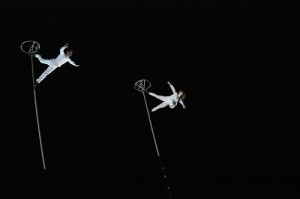“Acrobats” explores rhetorics of grace. It contrasts the simple and scripted made-for-TV “piety”—an easily imitated and consumed brand commodified and encouraged by the (early morning? early afternoon?) televangelist—with the speaker’s own halting attempts to “awaken [her] faith” to something beyond play-acting, beyond miming the preacher “in front of the mirror.” The pathos of her attempt—the depth of its influence on her, faltering as the attempt seems to be—is evident in the imagery she uses to describe “the homeless man” and her hesitant interaction with him: “the skittish horses of his eyes” as he “crossed the street for [her] two dollars,” her holding “out the stiff bills” to him “as if she were holding him / at gunpoint,” her “want[ing]” to analogize their exchange for him in the language and performance of metaphor.
Such emotional texture as this investment in more poetic language offers stands out against the matter-of-fact narrative the poet gives in the beginning of the preacher’s well-practiced piety. And this texture not only deepens what seems a simple poem, but it points to a more complicated, more human engagement with grace. Because it’s not as simple to understand and practice the principle of grace as merely putting on business attire (y’know, to garner others’ trust), talking a good game, and calling forth tears as you manipulate an audience into awakening a sensationalized, commodified faith. Rather it means making yourself vulnerable to others’ language, to others’ needs and then responding in kind—by sharing your own language and desires. It means performing with others the “high-rise routine” of human relation. It means stumbling and gaining experience and making that experience available to the world, all of which the poet does in and with “Acrobats.” After offering her money to the man, she withholds her language (see: “I wanted to tell him,” “I wanted to say”), something that might bridge the gap between them. In so doing, she stumbles and misses out on a potential unto-the-least-of-these relationship. But she then tries to fill this gap and expand her empathy, her human reach with this poem.
And in my mind such a narrative move is a greater indication of the storyteller’s character, a more powerful extension of grace, and a greater means of persuasion than any scripted, televangelized sermon ever could be.

